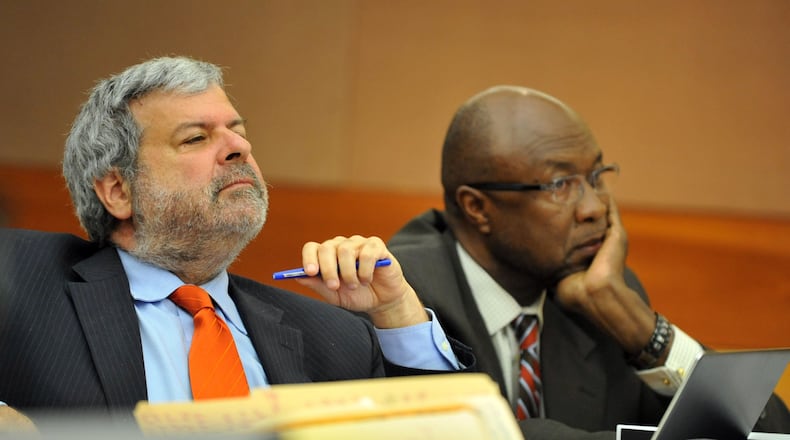The murder prosecution of DeKalb County police Officer Robert Olsen moved front and center this week as one of the most explosive and high-profile cases in recent Atlanta history.
Such cases often attract the brighter stars in the constellation of Atlanta trial lawyers, and Olsen has hired one of the brightest to handle his defense.
For decades, Don Samuel has tried some of the biggest cases to hit the news here: NFL stars Ray Lewis, Jamal Lewis and Ben Roethlisberger; the rapper T.I.; the Atlanta Public Schools test-cheating scandal; and the racketeering case involving the notorious Gold Club.
Shortly after Olsen's indictment, Samuel took the offensive. He criticized prosecutors for not calling witnesses who said Anthony Hill, who was naked and unarmed, was charging at Olsen before the officer shot and killed him.
“It’s a very tricky case,” Samuel said Friday. “I’ve spent a lot of time with him talking about what happened and I absolutely believe he was acting in self defense. I don’t think there’s any question he was in reasonable fear of his safety.”
The mere thought that Olsen could receive a life sentence, Samuel said, “is perhaps a sure sign this case is out of control.”
Samuel and his longtime law partner, Ed Garland, sometimes take outspoken positions in the media prior to trial. They know prospective jurors could be paying attention.
Samuel has said he feels as comfortable in a courtroom as just about any place else, and it shows as he often wins over judges in pretrial motions or jurors when asking for an acquittal. But that calm demeanor quickly changes when he enters a crowded courthouse elevator. The claustrophobic attorney says he gets nervous just thinking about confined places.
Samuel, 62, moved to Atlanta with his wife, the author Melissa Fay Greene, almost 34 years ago. They now have nine children, four by birth and five they’ve adopted or taken in — four from Ethiopia and one from Bulgaria.
After obtaining his law degree from the University of Georgia, Samuel became a law clerk for federal judge Harold Murphy in Rome.
In 1982, Murphy called Garland and recommended he hire his clerk. Samuel had the smarts, strength and compassion to do the kind of legal work Garland was doing, the judge said.
Garland recalled Friday that he interviewed Samuel over a basket of sweet rolls at Herren’s Restaurant downtown and that it took only 20 minutes before he offered him the job.
When Samuel told members of his synagogue that he and his wife were moving to Atlanta to join “the Garland firm,” congregants were aghast. Garland’s late father, the famous lawyer Reuben Garland, had defended George Allen Bright, who was charged with the 1958 bombing of The Temple on Peachtree Street. Bright was acquitted of the charges, and Greene would later write a book about it.
Ed Garland eventually asked Samuel to become his law partner and they’ve practiced together ever since.
“He has the biggest heart and the brightest mind and is the best lawyer I’ve ever met,” Garland said. “His breadth and mastery of the law goes from the erudition of a scholar to the down-home ability to relate to the common man with humor, kindness and persuasion.”
Samuel, who teaches at Georgia State and UGA law schools, has written books on federal and state court decisions on criminal case law — rulings that are favorable to the defense, of course. Still, his books are often cited not just by defense attorneys but by prosecutors and judges as well.
“It has been incredibly rewarding and exciting,” Samuel said of his legal career. “Nobody practicing law could be as lucky as I am. To be together with Ed for 34 years and have all the cases we’ve had with not even the slightest thought of division. I plan for us to work together another 34 years.”
About the Author
The Latest
Featured

